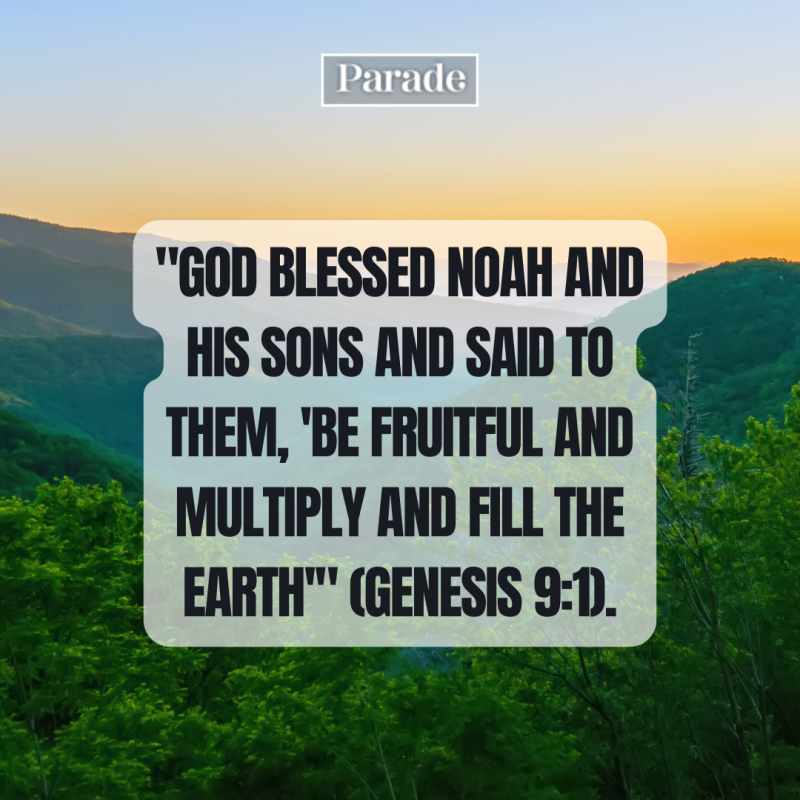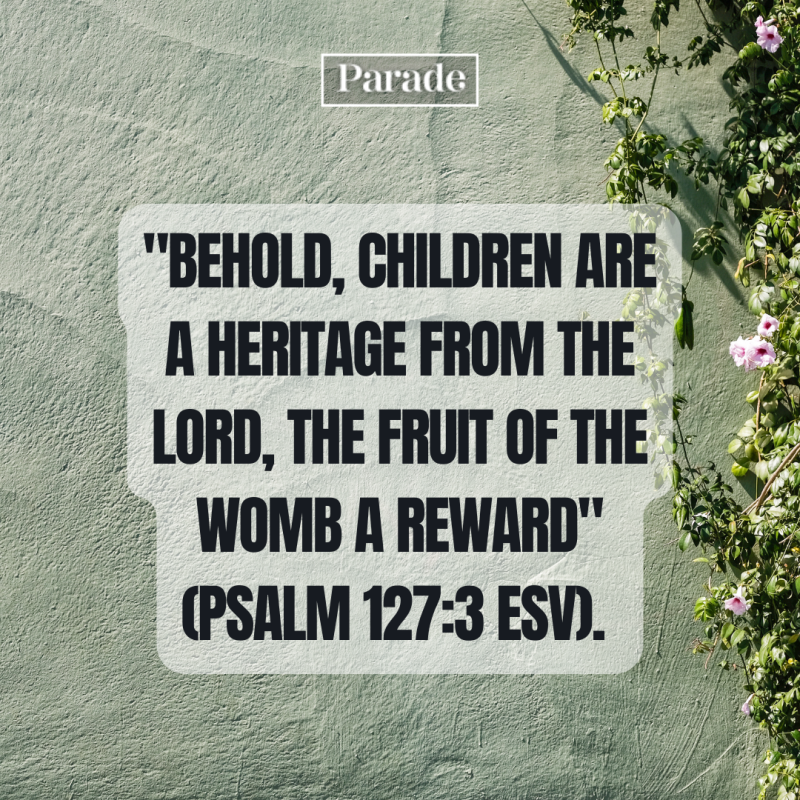'You Knit Me Together in My Mother's Womb'—17 Bible Verses About Pregnancy

Pregnant woman holding a Bible outside in a field
Pregnancy is one of the most beautiful and challenging experiences a person can go through. So, it's no surprise that there are plenty of scriptures about this particular topic. And we've pulled together 17 Bible verses about pregnancy to inspire you.
According to an article from the Jewish Women's Archive (JWA) by Rabbi Rachel Adelman, "In agrarian societies during the biblical period (1200-600 BCE), bearing children was highly valued and women’s primary role was that of mother."
Six times in the Old Testament, there are specific instances where a barren woman has her womb opened by God, an annunciation scene occurs, and that son is dedicated to God for a special purpose, often serving as a great leader, a deliverer or both. These stories emphasize the value of bearing children.
As with much of scripture, the metaphorical layers run deep. It's about a lot more than choosing to become pregnant, and having a baby. Let's look at 17 passages of scripture that discuss pregnancy—including women who were barren for a time—and consider what the divinely inspired authors of Scripture might have had in mind by sharing the particular details of this particular story.
Related: 125 of the Best Christian Baby Names for Boys and Girls Pulled Straight Out of the Bible
17 Bible Verses About Pregnancy
First, let's start at the beginning. What did God have to say about childbirth in the earliest days?
1. "To the woman he said, 'I will make your pangs in childbirth exceedingly great; in pain you shall bring forth children'" (Genesis 3:16b NRSV).
A lot of things changed in this chapter, shortly after God created everything, including man and woman, declaring it all good. From the moment Adam and Eve determined they wanted to have all knowledge of good and evil, childbirth got a lot more complicated. It was after these consequences had been declared that Eve bore Abel, Cain, and their other children (Genesis 4).

Canva/Parade
2. "God blessed Noah and his sons and said to them, 'Be fruitful and multiply and fill the earth'" (Genesis 9:1).
After the Great Flood, God made plans to inhabit the earth again. We see it clearly, it was a blessing for these men and their wives to be fruitful and multiply the earth again.
3. "Sarah conceived and bore Abraham a son in his old age, at the time of which God had spoken to him" (Genesis 21:2).
First, Genesis 11:30 explained: "Now Sarai was barren; she had no child." So, here, a Jewish matriarch, wife of Abraham and mother of Isaac, goes through a difficult season of infertility. In fact, she is 90 years old when she has her only son, Isaac. And this is after she decided to offer up her maidservant, Hagar, to Abraham, since she had been unable to have children of her own up to that point. God changed Sarai's name, opened her womb to give birth to Isaac in her old age, and the covenant promise God made to Abraham (Genesis 17) to the be father of many nations, was secured.
4. "Isaac prayed to the Lord for his wife because she was barren, and the Lord granted his prayer, and his wife Rebekah conceived" (Genesis 25:21).
On down the patriarchal line we go, and Rebekah too is barren. She gave birth to twins, Jacob and Esau. Their family lines can be traced throughout the Hebrew Scriptures, as both had a mighty impact on future nations of people. Here, it's particularly beautiful to think of Isaac praying to God on behalf of his wife.
Related: 50 Prayer Quotes
5. "Then God remembered Rachel, and God heeded her and opened her womb" (Genesis 30:22).
If you're familiar with the biblical narrative, you know Rachel to be Leah's sister, both married to Jacob (oh, the complexities), who is quite fertile. Of the twelve sons of Israel, Leah had half of them. So to say Rachel longed for a child of her own would be a gross understatement. Finally, finally "God remembered her."
We start to see a pattern emerge. For the ancients, the emphasis seems to be on the Hebrew word, "paqad," which translates as "take note," "remember" or "call to mind."
Another article by Rabbi Rachel Adelman points out the importance of God remembering these women. From "The Paradigm of the Barren Woman: How God 'Remembers' on Rosh Hashanah": "In all these three examples of healed barrenness, what happens is the natural conception of a child—but from the divine eye, it is the fulfillment of a long-awaited promise that God always intended to keep."
6. "And the angel of the Lord appeared to the woman and said to her, 'Although you are barren, having borne no children, you shall conceive and bear a son'" (Judges 13:3).
He would become one of Israel's great judges (and contestant for best hair), but Samson's mother too would struggle with barrenness before a heavenly visitor came to her, telling her she would give birth to a son, and he was supposed to live as a Nazirite, a specific lifestyle set apart by drinking no fermented drink, letting hair grow long, and avoiding contact with dead creatures (he broke at least two of these vows). Yet, in Samson's day, the Philistines were defeated on more than one occasion by his own hand.
7. "In due time Hannah conceived and bore a son. She named him Samuel, for she said, 'I have asked him of the Lord.'" (1 Samuel 1:20).
In due time, God gave Hannah the baby Samuel, and she gave him back in service. He lived in the Tabernacle his entire life, also set apart for the Lord, also living as a Nazirite. Eventually, he would be the prophet who anointed Israel's first two kings, Saul and David.
8. "[Elisha] said, 'At this season, in due time, you shall embrace a son.' She replied, 'No, my lord, O man of God; do not deceive your servant.' The woman conceived and bore a son at that season, in due time, as Elisha had declared to her" (2 Kings 4:16-17).
It's here, in the period of kings, when Israel has divided into northern and southern kingdoms, that we read about the final barren woman of the Old Testament.
This unnamed woman is identified as a distinguished woman who shows hospitality to the prophet, Elisha. She even housed him when he would come to the town of Shunem (a Jewish village in the northern kingdom territory of Issachar).
For her hospitality, Elisha assures the woman that God will give her a son. This son would unfortunately die, but Elisha brings him back to life. This story illustrates the ancient Jewish belief system of Psalm 127:3.
9. "Behold, children are a heritage from the LORD, the fruit of the womb a reward" (Psalm 127:3 ESV).

Canva/Parade
Related: 45 Uplifting Bible Verses About Women
10. "After those days his wife Elizabeth conceived, and for five months she remained in seclusion. She said, 'This is what the Lord has done for me in this time, when he looked favorably on me and took away the disgrace I have endured among my people'” (Luke 1:24-25).
In the first chapter of Luke, we're introduced to another barren woman in Scripture, the wife of a priest. Elizabeth is a relative of Mary, the mother of Jesus. She would give birth to John the Baptist, who would also live set apart, in many ways emulating the Nazirite lifestyle of Samson and Samuel. It's John the Baptist who paved the way for Jesus Christ. From the first time they met, in the womb, John the Baptist recognized the Messiah.
11. "For as soon as I heard the sound of your greeting, the child in my womb leaped for joy" (Luke 1:44).
12. "Therefore the Lord himself will give you a sign. Look, the young woman is with child and shall bear a son and shall name him Immanuel" (Isaiah 7:14).
Of the many Old Testament prophecies about the birth of Jesus, it's here in Isaiah we learn about the young woman who will be "with child." For Christians, it's the greatest pregnancy and birth the world has ever known.
13. "And she gave birth to her firstborn son and wrapped him in bands of cloth and laid him in a manger, because there was no place in the guest room" (Luke 2:7)
14. "Yet it was you who took me from the womb; you kept me safe on my mother’s breast. On you I was cast from my birth, and since my mother bore me you have been my God" (Psalm 22:9-10).
15. "From my birth I have leaned upon you, my protector since my mother’s womb. My praise is continually of you" (Psalm 71:6).
16. "For it was you who formed my inward parts; you knit me together in my mother’s womb" (Psalm 139:13).
17. "My little children, for whom I am again in the pain of childbirth until Christ is formed in you" (Galatians 4:19).
Writing to the church at Galatia, Paul picks up on this biblical metaphor of pregnancy, of trusting God's timing, of embracing the pain and blessing and promise that comes with childbirth. As a spiritual father, he knew the birthing bangs of bringing forth Christlikeness in a believer.
Up Next: 50 Comforting Bible Verses About God's Love
